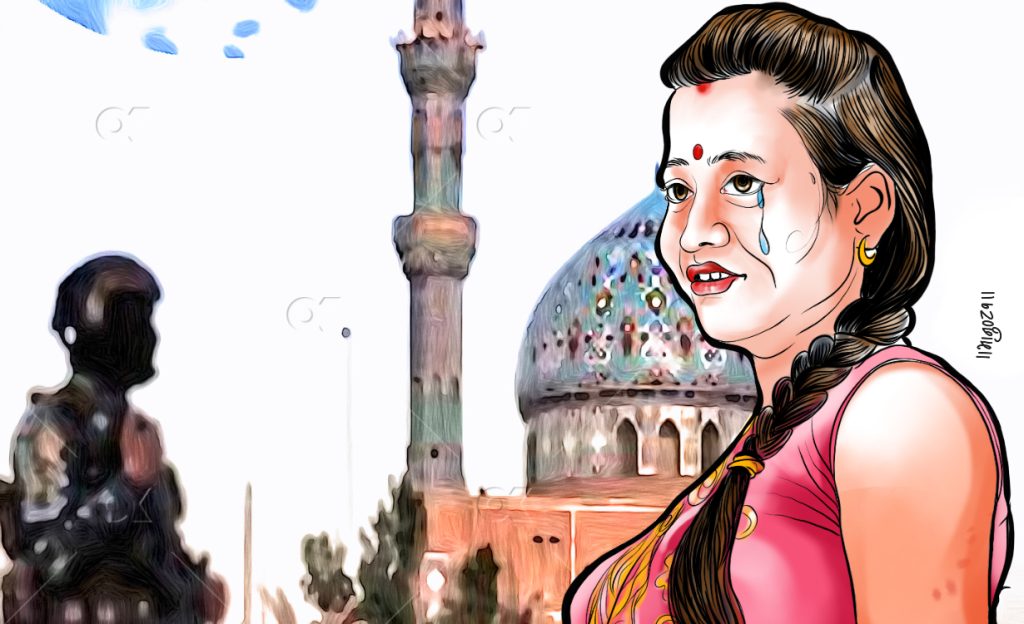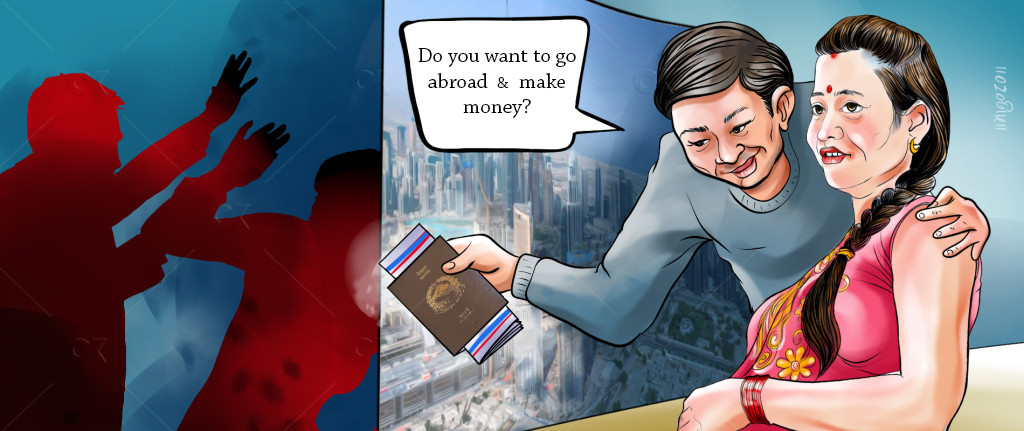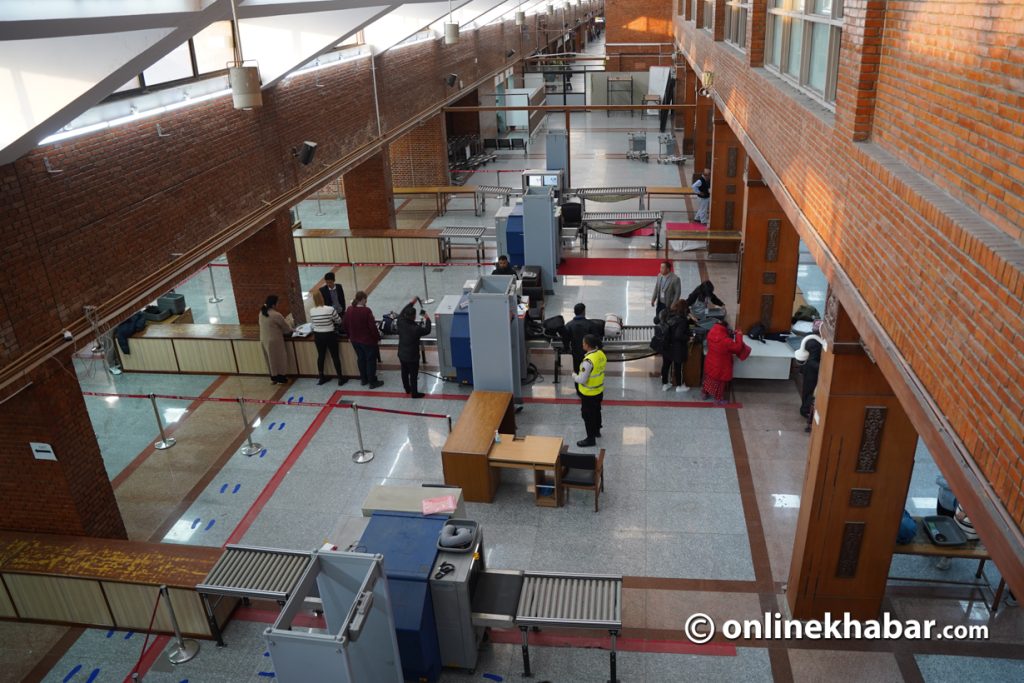
The trafficking of human beings constitutes both a criminal offence and a profound violation of human rights. Human trafficking has been defined variably in distinct national and international legislations.
Exploitation shall include, at a minimum, the exploitation of the prostitution of others or other forms of sexual exploitation, forced labour or services, slavery or practices similar to slavery, servitude or the removal of organs.
In the context of Nepal, according to Section 4 (1) of the Human Trafficking and Transportation (Control) Act of 2007, human trafficking is defined as selling or purchasing a person for any purpose, using someone for prostitution with or without any benefit, extracting human organs except otherwise determined by law, and engaging in prostitution.
Cabin restaurants, massage parlours, dance bars, khaja ghar, and dohori restaurants are categorised as establishments within the entertainment sector. The Supreme Court of Nepal affirmed this classification in the case of Pro Public v Government of Nepal et.al. writ no. 2822, NKP 2065, along with the subsequent directive guideline developed by the Supreme Court.
The entertainment industry has grown as an informal sector as most of the businesses are not registered with the concerned authorities to avoid tax and have not been properly monitored by government agencies.
Additionally, women and girls are predominantly recruited through the assistance of peers already employed in the entertainment sectors, as well as through relatives and intermediaries, among other means.
Human trafficking and exploitation for sexual activities

Furthermore, girls and women are selected based on criteria such as age and physical appearance. Women who are unmarried and do not have children are often preferred, indicating that these women are specifically targeted and exploited for sexual activities.
According to the report published by the National Human Rights Commission (NHRC), the growth of entertainment sectors is mainly reported to be in Kathmandu valley, Pokhara, Narayanghat and Itahari including other highway junctions.
It is widely reported that young girls from impoverished families are now being lured into working in the entertainment sector. Many of the workers come from rural villages outside of Kathmandu valley, and there is a consistency in victims’ stories of poverty, limited opportunity, and family difficulties, which increase their vulnerability to trafficking.
The majority of those involved in the entertainment sector and conducting sex work are trafficking victims. Nearly half entered the sex industry as children, and all children who are brought into commercial sexual exploitation are usually considered trafficking victims, whether they entered willingly or not.
Among those persons who entered as adults, many came into the entertainment industry hoping for a bright future in the city and did not understand that they would be conducting sex work.
Thus, those who end up in sex work are victims of fraud, deception enticement or allurement – and are defined as trafficking victims under Nepali and international law.
Referring to the definition provided by the UN Trafficking Protocol, it is accurate to assert that Commercial Sexual Exploitation (CSE) can be categorised as a form of human trafficking, as it involves the exploitation of individuals, particularly within the entertainment sector.
CSE is rampant as shown by various reports published which explicitly mention that the entertainment sector has become both the destination as well as the transit for the trafficking of girls.
Commercial sexual exploitation in the entertainment sector

While discussing the entertainment sector of Nepal, women, children and girls are susceptible to commercial sexual exploitation (CSE), which means when they are sold into a sex industry where the person employed is exploited for profit through sexual favours, stripping, prostitution and many more.
Referring to the definition provided by the UN Trafficking Protocol (Palermo Protocol), activities being conducted in the entertainment and hospitality sectors means or methods of recruitment of persons in those sectors and purpose are equivalent to human trafficking. Here’s a list of what happens in the entertainment sector:
- Cabin restaurants: The majority of cabin restaurants are small establishments, usually only a room containing a front counter and several plywood ‘cabins’, each containing a table and several chairs. The purpose of the cabin restaurant is to provide the customer with entertainment with girls and women that may range from simple conversation to kissing and touching, to masturbation, oral sex or sexual intercourse. Payment for liquor, food and sex is provided to the proprietor at the counter. The waitress may also receive additional money as well as tips from the customer.
- Dohori restaurants: Dohori establishments are venues in which customers are entertained by Nepali music and dance while consuming food and alcoholic beverages. In dohori establishments, customers typically sit in the open, at tables arranged around a small stage and dance floor. It is important to note that dohori venues do not typically facilitate sexual activities. However, customers may sometimes arrange to meet with waitresses for such purposes after their shift.
- Dance bars: Dance bars provide customers with the entertainment of girls and women dancing – sometimes in scanty apparel, sometimes nude. As in dohori and cabin restaurants, waitresses supplement their salaries by receiving a proportion of the proceeds from the alcohol and food purchased by the customers. In these establishments, waitresses often sit with customers, sharing conversations, smoking, and drinking together. It is worth noting that customers may engage in explicit language and physical contact. Additionally, it is not uncommon for customers to arrange private meetings with waitresses for sexual encounters after working hours.
- Massage parlours: Massage parlours are usually grouped with cabin restaurants, dohori and dance bars as ‘entertainment’ venues. However, massage parlours cannot correctly be classified as part of the ‘entertainment’ industry. However, unlike the other establishments, their purpose is to directly provide sex on the premises. Massage parlours are divided into rooms or cabins, each provided with a bed.
Risk factors that make them vulnerable
The majority of women and girls entering the entertainment sector often have limited education and skills. Many of them hail from economically disadvantaged families, with the responsibility to contribute to the family’s income or secure their own livelihood being a prevalent factor.
All of them were in need of work, but viable livelihood options were scarce. Many of these workers had left their homes, arriving in unfamiliar cities without knowing anyone, and lacking the support of friends or relatives.
Furthermore, a significant number of them were also uninformed about the work sector and the particulars of the job they had undertaken. Despite lacking specific skills, they were eager to secure employment, and being hired was a significant achievement for them.
In such circumstances, there was no inquiry made about their job description or a formal written contract. None of the respondents in the survey had a signed contract with their employer. The majority had come to Kathmandu in search of employment opportunities.
Many employees, especially the newcomers, had no other option than to tolerate abuse at the workplace as they had nowhere to go. These factors made them vulnerable in the workplace.
The Department of Women, operating under the purview of the Ministry of Women, Children and Senior Citizens, is another key government agency responsible for combating the abuse and exploitation of women.
The shelter homes for the survivors are run by civil societies with support from the government and development partners. However, many of these homes are overcrowded and running in lack of adequate funding.
The District Committee for Controlling Human Trafficking (DCCHT) and the Local Committee for Countering Human Trafficking (LCCHT) are not functional at the moment.
Nepal police as investigators, prosecutors as legal representatives and courts as adjudicators are there for justice for trafficking survivors and victims. The Anti-Human Trafficking Bureau of Nepal police, a dedicated wing to curb human trafficking in Nepal has started its works and activities to control human trafficking in Nepal.
Women and Children Service Directorate, Women and Child Service Centers, and other police offices are available all over Nepal to investigate and control the crimes of human trafficking.
Besides government institutions, civil society organisations have played a vital role in combating human trafficking in Nepal. There are some project-based programmes for free legal aid to victims.
These services require strengthening with improved services. Viable livelihood options for young people working in entertainment sectors or options for making these work sectors dignified.
To make these work sectors dignified, there should be a job contract in writing, a guarantee of minimum wage and strong monitoring by the government, along with improvements in the identification, investigation and prosecution of human trafficking cases in the entertainment sector.






















